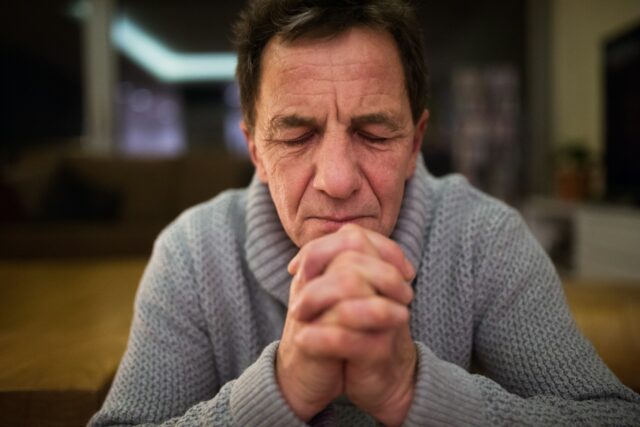Losing faith doesn’t always mean losing your sense of wonder about the universe and your purpose in life.

For many people, stepping away from religion or traditional belief systems isn’t the end of their spiritual curiosity—it’s the beginning of something more personal. They may no longer go to church or subscribe to specific doctrines, but they still feel a connection to something greater than themselves. Whether that’s nature, love, energy, or just the mystery of it all, the belief in “something bigger” often survives even when faith doesn’t. Here are just some of the reasons why some people leave formal belief behind, but still find meaning beyond themselves.
1. They outgrow rigid systems, but not their need for connection.

For many, religion once offered community, purpose, and structure. However, when those systems start to feel restrictive, outdated, or even harmful, people may walk away—not because they’ve stopped caring, but because they need more room to explore.
That doesn’t mean they stop believing altogether. Instead, they seek connection in less confined places. Spirituality becomes something fluid and personal—not tied to rules, but rooted in presence and awareness.
2. They start questioning and never get satisfying answers.

When someone begins to ask difficult questions—about suffering, exclusion, or contradictions—they might find that their old faith doesn’t hold up under scrutiny. For some, this marks the start of a slow unravelling. However, walking away from faith doesn’t kill the questions. In fact, it often deepens the desire to understand life, people, and purpose. They may lose their religion, but the mystery still matters to them.
3. They’re drawn to wonder, not dogma.

Traditional faith often relies on clear doctrines—answers, rules, structure. However, some people feel more connected to questions. They find magic in the unknown rather than in certainties. For them, the idea of something bigger isn’t about controlling life’s meaning—it’s about honouring the fact that we don’t fully know. It’s curiosity, not compliance, that keeps their belief alive.
4. They experience trauma within religious settings.

Sadly, some people lose their faith because they were hurt by it. Judgemental teachings, spiritual abuse, or exclusion can all cause someone to walk away—not from belief itself, but from the environment that once held it. Despite the pain, many still feel drawn to a deeper source of love or healing. Their belief becomes quieter, more cautious, but still present, and often more real than ever before.
5. They find spirituality in nature, art, or human connection.

You don’t need a church pew to feel reverence. Some people feel closest to something bigger when they’re walking in a forest, watching a sunrise, or listening to music that stirs something deep. These moments aren’t random—they’re sacred in their own way. For those who’ve left religion behind, everyday beauty often becomes their form of prayer.
6. They still feel connected to love, kindness, and energy.

Even without a belief in God, many people still feel a sense of force in the world—something that shows up in compassion, in resilience, in the quiet bonds between people. It might not have a name or a face, but it feels real. The sense that something holds us, or moves through us, remains, even when religious language no longer fits.
7. They crave meaning, even if they don’t know where to find it.

Letting go of faith can leave a gap. For a while, things might feel hollow. However, as time goes on, many people rebuild their sense of purpose in new ways—through creativity, relationships, or simply being present in the moment. They don’t have all the answers, but they’re not drifting. They’re actively searching, feeling, and living in a way that still honours life’s depth.
8. They see spirituality as something you live, not label.

For some, belief doesn’t need to be declared. It’s not a box you tick—it’s how you treat people, how you move through the world, how you sit with silence or offer kindness when no one’s watching. They might not identify with any religion, but their actions reflect a deep inner compass. They live their beliefs more than they talk about them.
9. They believe in energy and interconnectedness.

Some people move from a personal deity to a belief in universal energy—the idea that we’re all connected, and that what we do ripples outward. It’s less about worship, more about awareness. They find meaning in how things interlink—how nature adapts, how emotions move through bodies, how timing seems to unfold. It’s subtle, but powerful.
10. They still feel a pull towards ritual, even if it looks different.

You don’t need to recite verses or attend services to have rituals. Lighting a candle, journaling, going for a mindful walk—these are modern-day sacred acts for people who’ve stepped away from tradition. Rituals offer grounding, reflection, and intention. For many, they replace what faith once gave them, and they do it without the pressure of belief.
11. They learn that doubt and belief can coexist.

Some people leave religion because they were told doubt was dangerous. But in time, they realise that questioning doesn’t mean you’re faithless—it means you’re paying attention. They make peace with not knowing, and in that grey area, something quiet grows—belief without certainty. Hope without control. A kind of reverence that doesn’t require full understanding.
12. They still believe in goodness, even when faith lets them down.

People can walk away from religious belief and still deeply trust in human goodness, acts of kindness, or the moral compass inside them. For them, this is their version of something bigger. It’s not just about what’s “up there.” It’s about what we do with the time and choices we have. They believe in something greater, and sometimes that something is us.
13. They see belief as deeply personal, not one-size-fits-all.

After experiencing pressure to believe a certain way, many people walk away to reclaim autonomy. They want belief to feel like theirs, not something handed down or imposed. They still value spirituality, but only when it comes from within. For them, it’s less about fitting into a group, and more about staying true to what rings quietly true in their own heart.
14. They’ve seen the harm done in the name of faith.

Watching faith used to justify harm—whether through exclusion, guilt, or violence—can make belief feel loaded. Many walk away to protect themselves or others from further pain. And yet, they don’t abandon the idea that something good or wise might still exist beyond all that. They just don’t believe it lives inside systems that cause more hurt than healing.
15. They believe the mystery matters, even without answers.

In the end, some people simply believe that not everything needs to be solved. That the stars still mean something. That love is real, even if we can’t define why. That there’s something sacred in just being alive. They don’t need a label for it. They don’t need to explain it. They just feel it, live it, and let it move through them. Sometimes, that little belief is the most grounded kind of faith there is.



